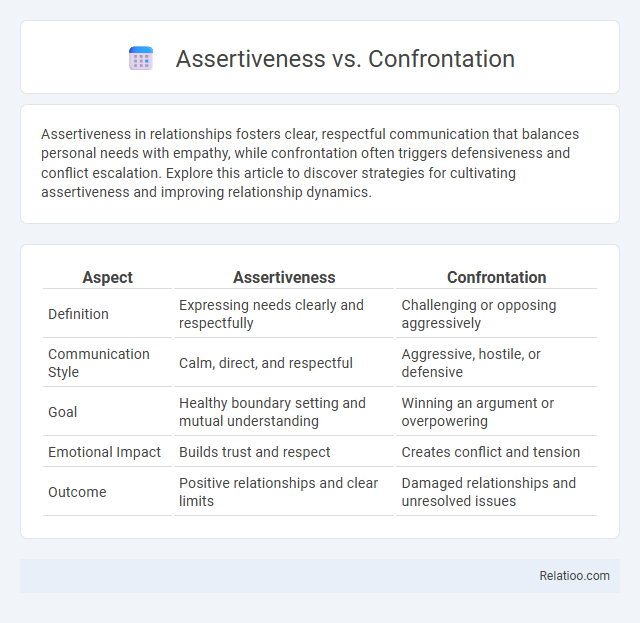Assertiveness in relationships fosters clear, respectful communication that balances personal needs with empathy, while confrontation often triggers defensiveness and conflict escalation. Explore this article to discover strategies for cultivating assertiveness and improving relationship dynamics.
Table of Comparison
| Aspect | Assertiveness | Confrontation |
|---|---|---|
| Definition | Expressing needs clearly and respectfully | Challenging or opposing aggressively |
| Communication Style | Calm, direct, and respectful | Aggressive, hostile, or defensive |
| Goal | Healthy boundary setting and mutual understanding | Winning an argument or overpowering |
| Emotional Impact | Builds trust and respect | Creates conflict and tension |
| Outcome | Positive relationships and clear limits | Damaged relationships and unresolved issues |
Understanding Assertiveness: Definition and Importance
Assertiveness is the skill of expressing your thoughts, feelings, and needs confidently and respectfully without infringing on others' rights, fostering effective communication and healthy relationships. Understanding assertiveness helps you distinguish it from confrontation, which often involves aggressive or hostile interactions, while assertiveness promotes clarity and mutual respect. Mastering this balance enhances personal and professional interactions by enabling you to advocate for yourself calmly and constructively.
What Constitutes Confrontation?
Confrontation involves direct and often aggressive communication that challenges another person's behavior or views, frequently triggering defensive reactions. Unlike assertiveness, which expresses your needs and boundaries clearly and respectfully, confrontation tends to escalate conflict by prioritizing winning over understanding. Understanding what constitutes confrontation helps you navigate difficult interactions more effectively, promoting constructive dialogue rather than antagonism.
Key Differences Between Assertiveness and Confrontation
Assertiveness involves expressing Your thoughts and feelings confidently and respectfully without violating others' rights, promoting effective communication and mutual understanding. Confrontation, however, often implies a more aggressive or hostile approach, potentially escalating conflicts by challenging others directly or emotionally. Key differences lie in tone, intent, and outcome: assertiveness seeks resolution and cooperation, while confrontation can provoke defensiveness and tension.
The Psychology Behind Assertive Communication
Assertiveness in communication involves expressing Your thoughts and feelings honestly and respectfully, maintaining self-confidence without aggression. Confrontation, often mistaken for assertiveness, tends to provoke conflict by emphasizing opposition rather than mutual understanding. The psychology behind assertive communication reveals it promotes emotional regulation, reduces anxiety, and enhances interpersonal relationships by balancing honesty with empathy.
The Risks and Consequences of Confrontational Behavior
Confrontational behavior often escalates conflicts, leading to damaged relationships and increased stress for all parties involved. It can result in communication breakdowns, reduced trust, and a hostile environment that impairs collaboration and productivity. Unlike assertiveness, which promotes clear and respectful communication, confrontation risks creating adversarial dynamics that hinder problem-solving and emotional well-being.
Benefits of Practicing Assertiveness in Daily Life
Practicing assertiveness in daily life enhances your communication by enabling clear expression of thoughts and feelings without aggression or passivity, fostering mutual respect and understanding. It strengthens relationships by promoting honest dialogue and reduces stress by preventing misunderstandings and resentment. Assertiveness empowers you to set healthy boundaries, improving confidence and emotional well-being.
Common Misconceptions About Assertiveness and Confrontation
Assertiveness is often mistakenly equated with confrontation, but assertiveness involves expressing your thoughts and needs respectfully without aggression, while confrontation implies conflict or hostility. Many believe assertiveness leads to arguments, yet it actually fosters clear communication and boundary-setting, reducing misunderstandings. Understanding these distinctions helps you communicate confidently without escalating tension or causing unnecessary disputes.
Real-Life Examples: Assertive vs Confrontational Responses
Assertiveness involves expressing one's thoughts and feelings calmly and respectfully, such as calmly stating a concern during a team meeting to improve workflow. Confrontation often entails a more aggressive or hostile stance, like raising one's voice or blaming others when addressing a problem. Real-life examples highlight how assertive responses promote constructive dialogue and problem-solving, whereas confrontational reactions frequently escalate conflicts and hinder resolution.
How to Transform Confrontation into Assertiveness
Transforming confrontation into assertiveness involves recognizing your emotions and expressing your needs clearly without aggression or passivity. You establish boundaries and communicate your perspective respectfully, which reduces conflict and builds mutual understanding. Your ability to listen actively and maintain calm helps convert potential disputes into constructive dialogues.
Tips for Developing Healthy Assertive Skills
Developing healthy assertive skills involves clear communication of your needs and boundaries without aggression. Practice active listening to understand others' perspectives and use "I" statements to express feelings respectfully. Building self-confidence through role-playing scenarios and seeking feedback can enhance assertiveness while avoiding confrontational behavior.

Infographic: Assertiveness vs Confrontation
 relatioo.com
relatioo.com